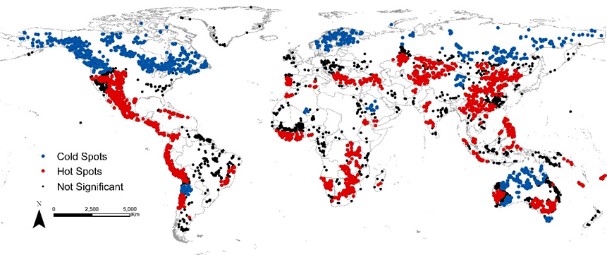
Growing demand for metals necessary for the transition to a low carbon future could create high-risk mining ‘hotspots’ that will put pressure on communities and environments.
Researchers from the Sustainable Minerals Institute identified the mining hotspots, where competition over resources like water and land will increase, after designing and applying a matrix of environmental, social and governance (ESG) indicators to 6888 mining projects representing 20 different metals.
SMI Research Fellow and study lead author Dr Éléonore Lèbre said the findings quantitatively confirm concerns that the transition to a low-carbon economy will lead to more mining in high-risk contexts.
“Past research has raised concerns about the ESG pressures resulting from increased mining but they have never assessed the risks on a global scale using quantitative data,” said Dr Lèbre.
“By applying seven categories of risk – including three environmental, three social and one governance indicator – we were able to map where pressure would be highest and what metals involve the most risk.
“All the metals we analysed are necessary for the transition to a low-carbon future. Some exhibit particularly risky profiles, with 84% of platinum and 70% of cobalt resources located in high-risk contexts.
“Major metals like iron and copper are rarely talked about in the energy transition discussion, but they will be needed in large quantities, and they are set to disturb large areas of land as production volumes increase.
“Australia, the United States of America and China will be the most affected, having the largest clusters of mines located in potential high-risk contexts.
“Good governance in these countries will be key to ensure the energy transition happens without unleashing unacceptable social and environmental impacts induced by mining.”

Leader of SMI’s Complex Orebodies Program Professor Rick Valenta said the industry will need to demonstrate it can effectively address ESG risks in order to overcome future obstacles to supply.
“The rise of renewable energy technologies and electric vehicles will mean that metals, such as lithium, cobalt, copper and nickel will become increasingly important for society,” Professor Valenta said.
“In order to access the increasingly high-risk orebodies necessary to meet this demand, the mining industry needs to prove its environmental and social responsibility to an increasingly conscious public.”
To read The social and environmental complexities of extracting energy transition metals visit the nature communications website.
Media: Dr Eléonore Lèbre, Research Fellow, e.lebre@uq.edu.au, +61 7 3346 4137; Connor Pound, Media Officer, c.pound@uq.edu.au, +61 447 812 081



